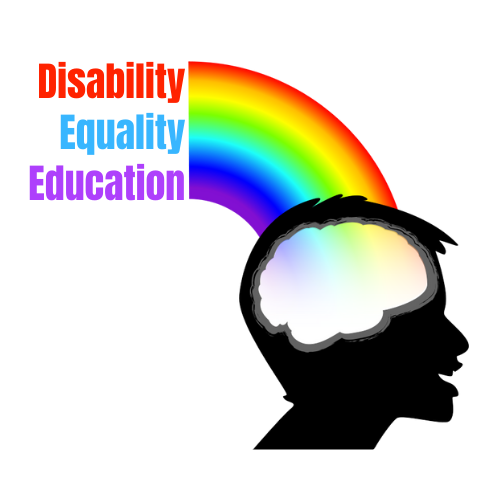
The Americans with Disabilities Act: Taking Action for Access Lesson by National History Day
By analyzing various primary and secondary sources, students will determine how citizen activism among the disabled community led to passage of the Americans with Disabilities Act (ADA) in 1990. After reviewing ADA provisions that improved access to public facilities and the workplace, students will identify continued areas of need for people with disabilities and develop public service announcements that promote personal responsibility for maintaining accessibility.
Image Description: National History Day logo, “The Americans with Disabilities Act: Taking Action for Access,” and a series of 4 blue and white accessibility symbols arranged in a diamond pattern with “Americans with Disabilities Act” along the top edges.

Americans with Disabilities Act Lesson by C-SPAN
This lesson details the provisions of the Americans with Disabilities Act signed by President George H.W. Bush. It also looks at the 20th Anniversary speech made by President Barack Obama and his vision for the future of Americans with Disabilities.
Image Description: C-SPAN Classroom logo, “Americans with Disabilities Act” and photo of the signing of the ADA
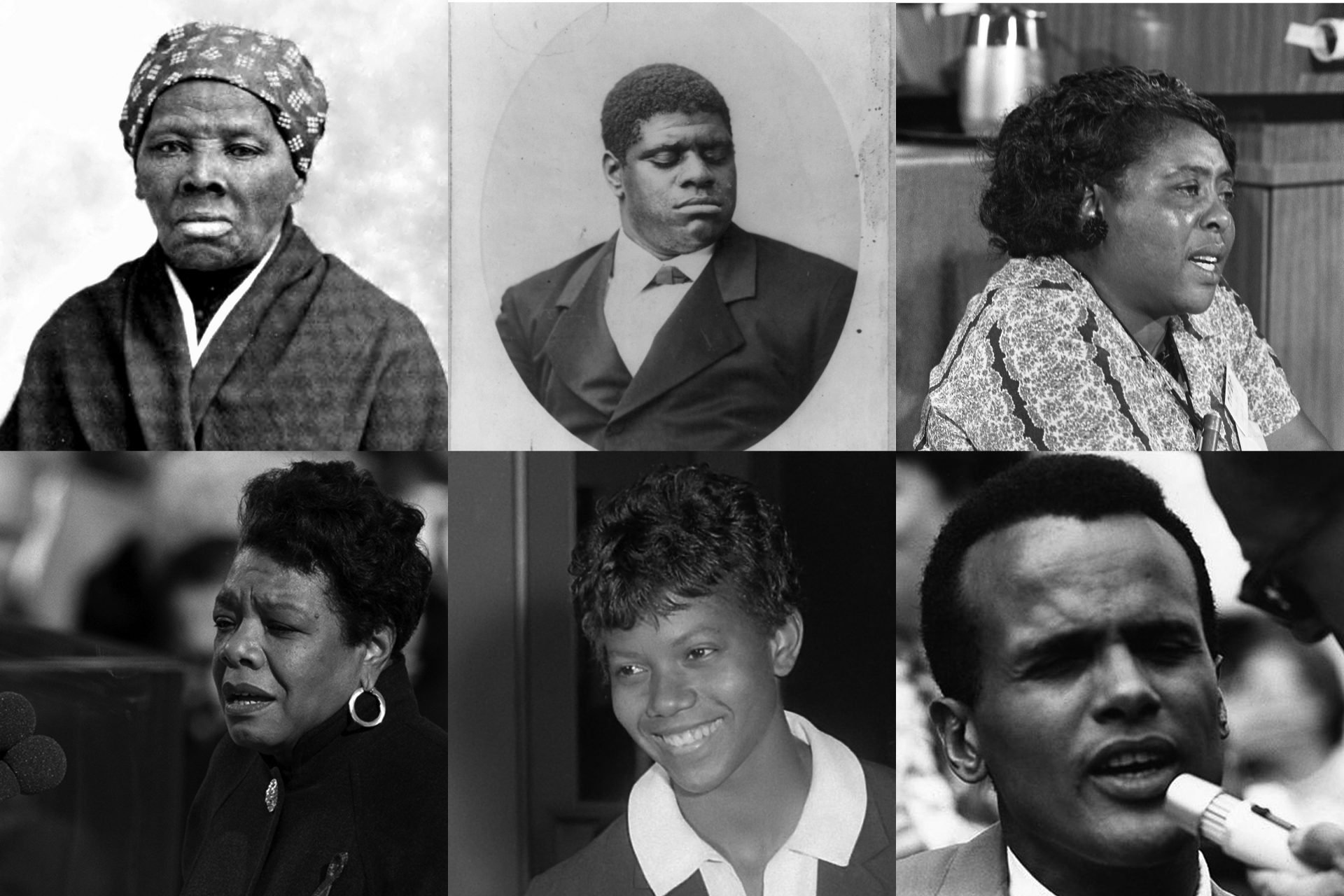
Black Disabled History Lesson
In this lesson, students will be invited to research a famous Black Disabled person, either from history or modern day. Students will work in groups or individually to research their assigned person and create a final project in a creative format. Students will then present their findings to the class.
Image description: Photos of 6 famous Black Disabled people: Harriet Tubman, Tom Wiggans, Fannie Lou Hamer, Maya Angelou, Wilma Rudolph, and Harry Belafonte

Book Read A Loud Video List
On the YouTube page linked you will find a playlist with dozens of read a loud videos of books that we believe will add opportunities to incorporate disability representation in natural, positive ways to your class.
Image description: colorful books on a dark bookcase

Calculating the Distance Lesson by Rick Hansen Foundation
In this lesson, students complete grade-appropriate math problems using facts and figures from Rick Hansen’s Man In Motion World Tour. Students will examine mathematical problems evolving out of the day-to-day challenges of Rick Hansen’s Man In Motion World Tour. Students will apply multiplication and division skills to real-life math problems. Students will apply conversion skills to real-life math problems.
Image Description: Logo of Rick Hansen Foundation.
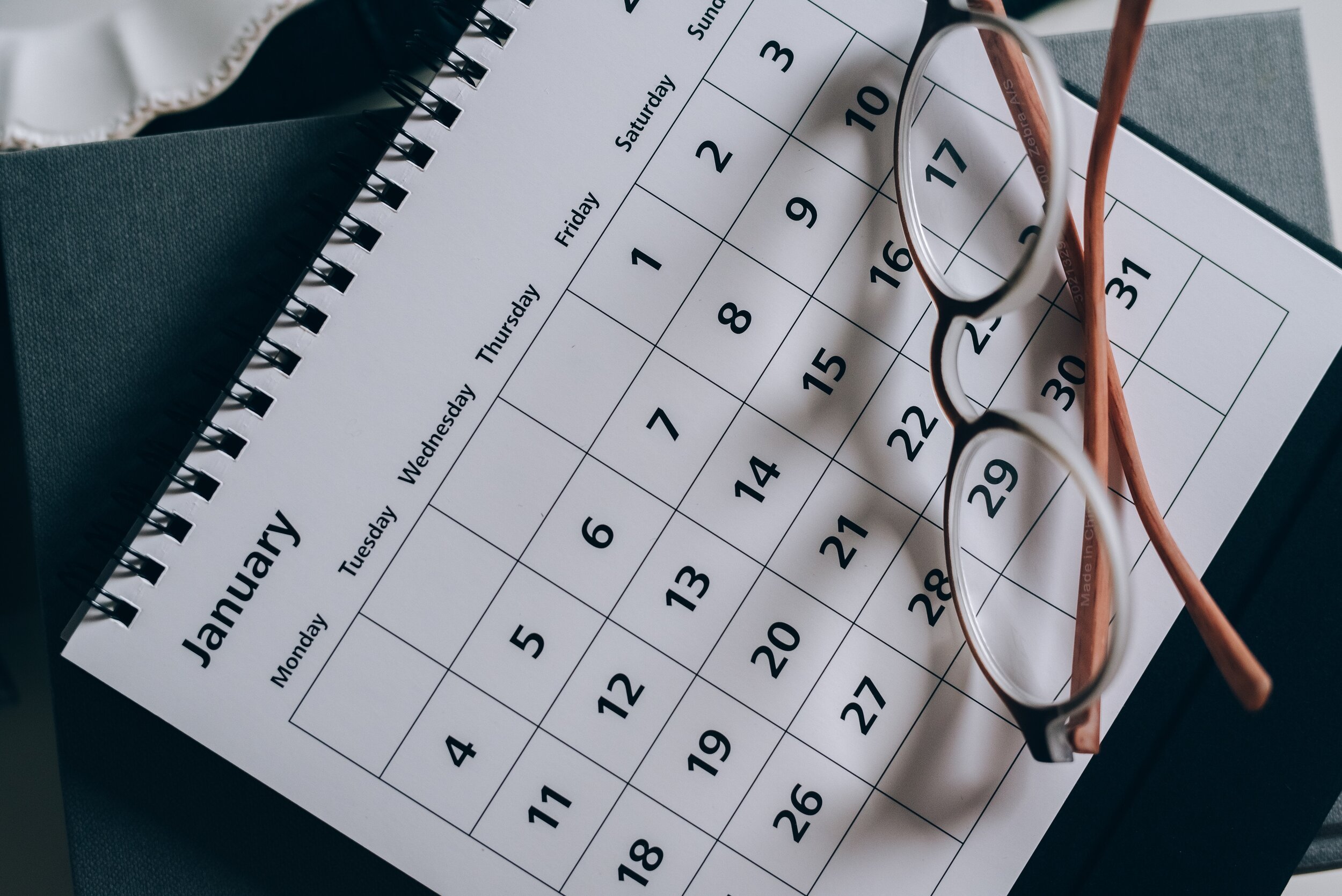
Calendar of Events
A calendar of events that recognizes various days (and months) is an easy way to bring the conversation about disability into your classrooms and schools. Including discussion of disabled people throughout the year sends a message to all that disabled students are recognized and valued as a part of the education community.
Image description: calendar page tilted at an angle, reading glasses rest on the bottom corner of the calendar
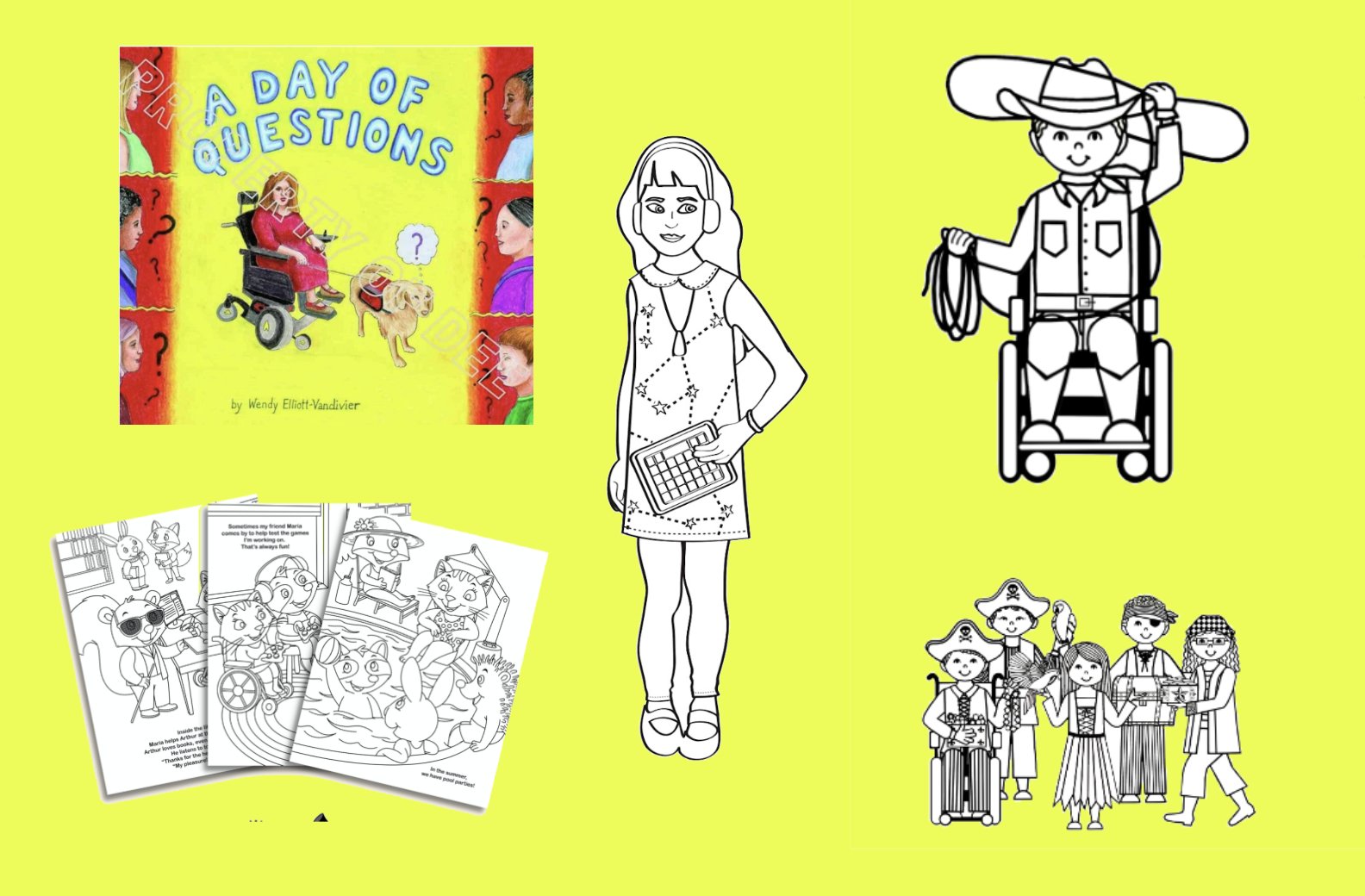
Coloring Books, Pages and Clip Art with Disability Representation
Including coloring pages and artwork in lessons (some of these allow you to use as clip art) that includes disability representation furthers the goal of regularizing disability by seeing it and offering opportunities to learn and ask questions.
Image Description: small images of the coloring books on a yellow background

Critical Media Analysis: Autistic characters in children’s media
Summary:
In this lesson, students will look at four different characterizations of autistic children in contemporary media. They will watch excerpts or videos featuring the characters, read about the characters, and study how they were created. They will then fill out an evaluation chart to analyze the different depictions. They will have a group discussion as a class and write a reflective response.
Issues considered will include: character’s role within the show/movie; who was involved in writing/creating the characters; what public response has been; and so on. The lesson will conclude with a group discussion and students will complete a journal-style piece of writing as an exit ticket.
The characters that the students will learn about are:
Julia from the television show Sesame Street;
Pablo from the television show Pablo;
the main character from a Pixar short called Loop;
Carl, from the show Carl the Collector.
Image Description: Upper left quadrant is Julia, a muppet with yellow skin and orange hair. Upper right quadrant shows the main character from Loop, a girl with brown skin and dark hair who is reaching with her hands to touch reeds. Bottom left quadrant shows Pablo, a hand-drawn boy with light skin standing on a green hill with a rainbow behind him. Bottom right quadrant shows Carl, an illustrated raccoon wearing an argyle sweater.

Disability and Disability Arts Vision Loss - Disability Empowerment “Disability Looks Like You and Me”
Disability and Disability Arts Vision Loss - Disability Empowerment “Disability Looks Like You and Me”
This is a three part lesson to introduce the student to disability and a disabled artist's work. Disability arts is an art form where the context of the art takes on disability as its theme. Disability art is about exploring the various realities of what it's like to be disabled. The theme of disability may be used in a variety of ways in how the artist chooses to represent the theme in their work. This lesson uses art created by Jade Ramos.
Image description: A colorful abstract artwork featuring a silhouette of a person with long hair outlined in bright neon colors. The background is filled with vibrant, swirling patterns. Text says “Every One Matters, Even You” along the left and right edges. The person is wearing a shirt with the text “Disability Looks Like You and Me”

Disability History through Primary Sources
As our friends from Engaging America state, “Primary sources … can provide entry points and deepen exploration into historical events. Primary sources add immediacy, such as the faces in a photograph, the emotional tone of a drawing or song, or the complex look of a handwritten document. Documents from multiple points of view can illuminate conflicting ideas and events. Varied media, including maps, oral histories, published reports, and graphs offer many options for connection and investigation”.
We share these collections or primary sources as tools to continue introducing disability into the conversation from natural perspectives, using disabled people to tell their own stories whenever possible.
Image Description: Article from Dallas Times Herald, Wednesday, January 14, 1986 in section “Community Close-Up” titled “Police on sidewalk wheelchair ramps changed”
Full image description can be found at: https://adaptmuseum.net/gallery/picture.php?/451/category/16

Disability Justice Lesson Plan - Education Amplifier
In this lesson plan, you’ll find six modules that you can mix and match, that all teach about different aspects of disability rights and disability justice.
Image Description: Education Amplifier’s illustration of Lydia X.Z. Brown
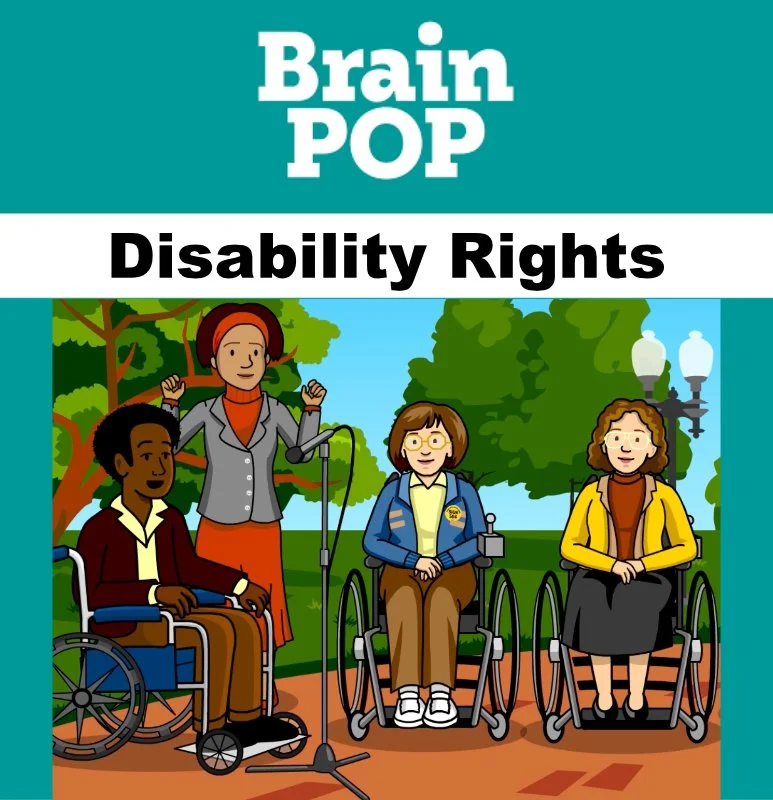
Disability Rights Lesson by BrainPOP
This BrainPop video and associated resources introduce the Disability Rights movement through the fight for Section 504, the law that paved the way for the Americans with Disabilities Act.
Image Description: BrainPOP logo, “Disability Rights” and animated screenshot from the video showing 4 people outdoors, 3 are seated in wheelchairs, one is standing in front of a microphone.

Drawing your City - the Art of Stephen Wiltshire
In this lesson, students will be exposed to the artwork of Stephen Wiltshire. Wiltshire is from Britain and known for his large-scale detailed drawings of cityscapes. After learning about Wiltshire, who is autistic, students will have the opportunity to draw their own cityscape, inspired by Wiltshire’s art. For an extra geographic element, they can write facts about their city and create a bulletin board display. They will also consider how Wiltshire is often most widely described as a savant/genius, and how these words can create challenging stereotypes, both for the autistic community and for artists. For both, these words set up unrealistic expectations about who autistic people are/can be, and what art is/can be/how much training and practice is required to be an artist.
Image Description: Photo from behind a person wearing a dark jacket and a cap with headphones that is drawing on a large, detailed cityscape illustration. The drawing appears to be a bird's-eye view of a city with numerous buildings and streets.

Emerging America - Disability, Civic Engagement, and Government
Summary:
This unit works particularly well in a course on civics and government. The intro lesson introduces key information and can be useful to check student knowledge and experiences. Lesson 1 is essential to introduce the unit's study of disability. Lessons 2 & 3 delves into work for disability rights, including transformative legislation. In lesson 4, students apply what they have learned about civic action to research, plan, and carry out their own civic engagement project. (This lesson is also used for Grades 9-12.) Lesson 5 can stand alone or fit within the unit; it adds disability rights as an option for study of historic Supreme Court cases.
Image Description: Emerging America logo above text that reads “Grades 6-8: Disability, Civic Engagement, and Government” above a black and white photo of an ADAPT Protest c. 1990

Everyone Spoke Sign Language - The Chilmark Deaf Community
In this lesson, students consider how people communicate when they do not speak a common language. The Chilmark Deaf Community serves as a case study to engage with the wide variety of languages spoken on the Island (presently and in the past). From 1694 to 1952, Martha’s Vineyard - and specifically the towns of Chilmark and West Tisbury - had an unusually large population of people with hereditary deafness. As a result, the residents of the Island developed a local dialect of sign language, used by hearing and deaf people alike, allowing the Deaf community full and unbiased integration into Island society at large. Scientists and researchers studying the causes of deafness took great interest in Martha’s Vineyard because of deafness’ prevalence there.
Image Description: A mural with 4 simplistic cartoon-style characters drawn in black on a light tan background using sign language, movements are shown with arrows. There is foliage at the bottom and a brick wall at the top of the photograph.

Exploring Nancy Polette’s “The Spy with the Wooden Leg: The Story of Virginia Hall” with the help of a reading journal
The students will learn how to use a reading journal to aid their exploration of a biography “The Spy with the Wooden Leg: The Story of Virginia Hall” which will be read as a class and individually. This reading will be slow in order to help support students’ discovering how to read, process, and reflect upon biography in the form of a chapter book and use this information to enrich their study of History. Many aspects of this lesson are flexible and can be adapted to the needs of your students.
Some themes of war may be difficult for some students, it is recommended that no new difficult content be introduced on a Friday or before a long break so that the class can have the support they need as they learn about these difficult themes.
Image Description: cover of the book “The Spy with the Wooden Leg: The Story of Virginia Hall By Nancy Polette”

Expressive Landscapes: The Art of Mary Duffy
In this lesson, students will learn about the paintings of Mary Duffy, a multidisciplinary artist from Ireland. Mary paints expressive landscapes, often inspired by the seashores. In this lesson, students will review her paintings, and be invited to create 2 pieces of artwork inspired by different elements of Mary Duffy’s practice. One will be done in the classroom, and a second will be done in nature, with direct observation (this may be assigned as homework, depending on the weather). Students will also be invited to reflect about issues of accessibility related to nature exploration and disabled people.
Image Description: A photo of Mary Duffy painting a canvas at the beach. She is seated, wearing a red dress, using her feet to paint the canvas in front of her on a short easel. The text “Expressive Landscapes: The Art of Mary Duffy” is at the top of the image.
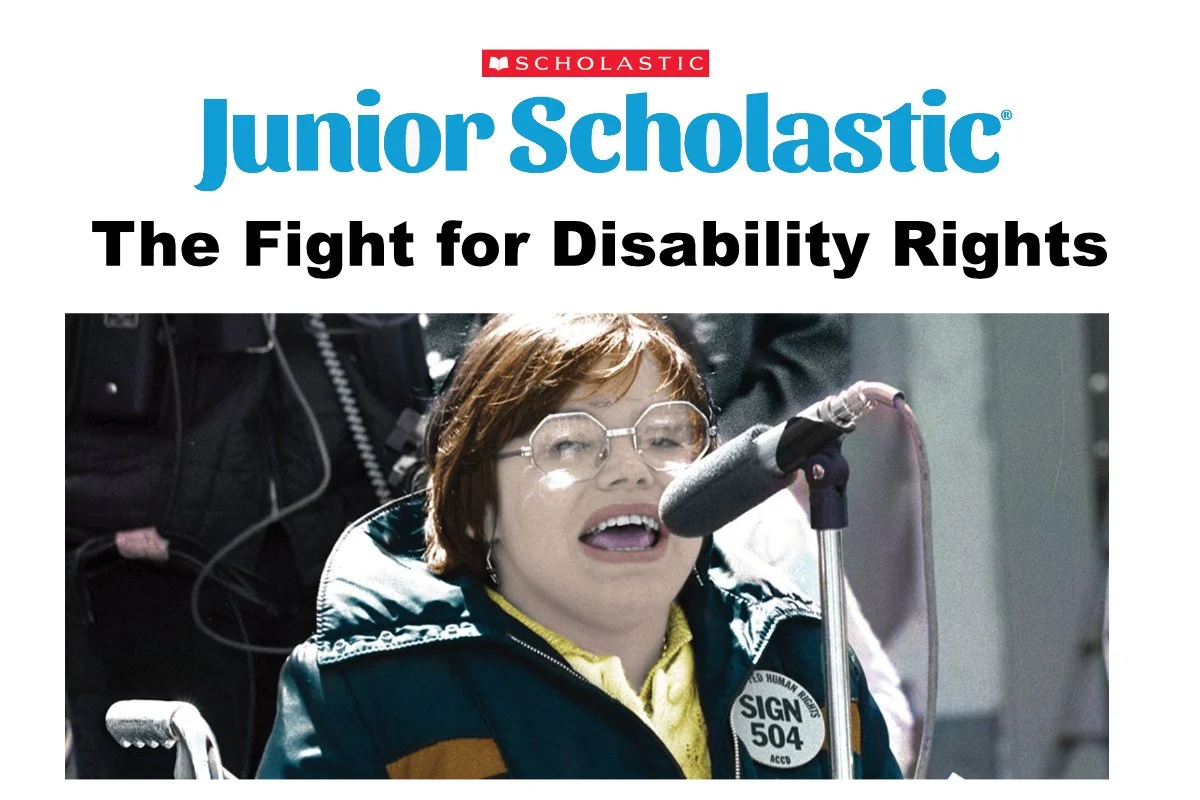
The Fight for Disability Rights Lesson by Junior Scholastic
A lesson plan based on the Scholastic article “The Fight for Disability Rights,” where students learn about the Americans with Disabilities Act.
Image Description: Junior Scholastic logo above text “The Fight for Disability Rights” and a photo of Judy Heumann speaking at a rally in 1977. She is wearing a big round button that says “Sign 504”

Happy Paintings - The Art of Maud Lewis
In this lesson, students will learn about the art of Maud Lewis, a prolific Canadian folk artist who lived in rural Nova Scotia (Eastern Canada, near the Atlantic Ocean), and worked in the mid-20th century. She is now believed to have been born with juvenile rheumatoid arthritis, but it was not diagnosed or treated in her lifetime. Students will learn about her artwork, rooted deeply in the place where she lived, and have the opportunity to keep a sketchbook for a week, and create a painting in Maud Lewis’ style that reflects their own local world. Students will also consider the complex intersections between disability, poverty and the arts that are embedded in Maud’s life story.
Image Description: a painted clam shell that features a red birdhouse in the center, surrounded by colorful flowers and two blue birds on either side. The shell is mounted on a wooden background. The artist's name, "Maud Lewis," is visible on the shell.
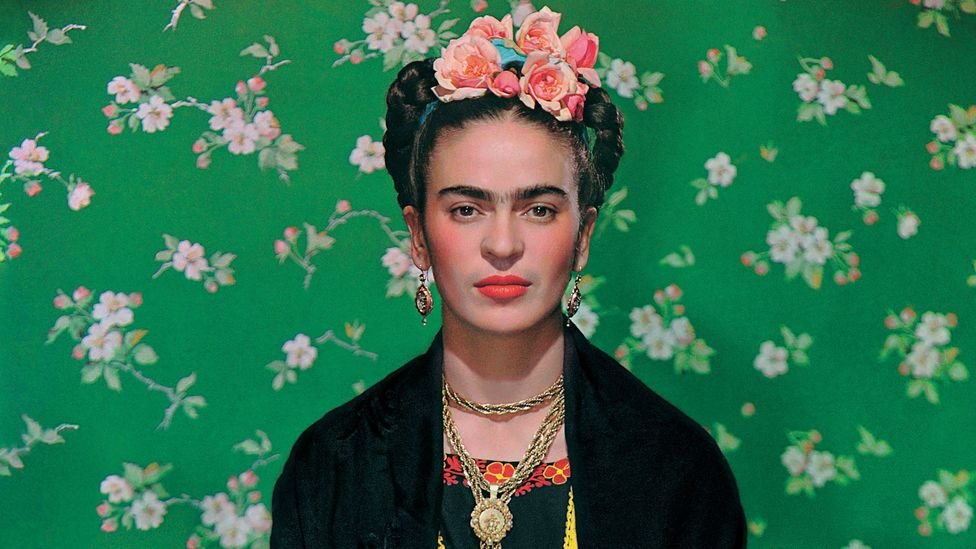
Hispanic Heritage: Frida Kahlo (Intersectionality of Ableism, Creativity and Feminism) Lesson
Frida Kahlo (1907 - 1954) was a Mexican artist who was influenced by the Mexican Revolution. She experienced a disability at two times in her life. Her determinism helped her cope with the pain of overcoming polio, a difficult marriage and bus-trolley accident. Frida Kahlo’s curiosity and love for nature were often the subjects of her paintings. Known as the “mother of the selfie,” Frida also created more than 200 paintings of herself. This unit of lessons is to recognize the creativity and imagination of Frida Kahlo.
Image description: Photograph of Frida Kahlo against a green floral background
